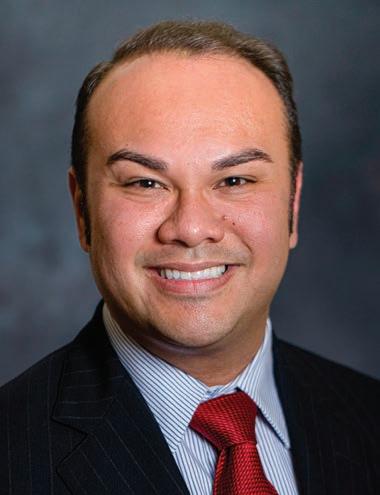
5 minute read
Interview: Paul Redman
Economy Chester County is home to 15,529 businesses that employ around 310,000 people, representing around 3.8% of Pennsylvania’s total jobs. Healthcare and social assistance provided around 15% of jobs in 2018, followed by retail at 11%, professional and technical services with 10% and finance and insurance at 8%. The majority of Chester County establishments are small and mediumsized enterprises (SMEs), with over 10,500 small businesses employing between two and nine people, while 16 businesses have 1,000 or more employees. From 2000 to 2018, Chester County saw significant job growth of over 20%, outpacing the national average and the state average. As of 2019, investment management firm The Vanguard Group was the largest employer, followed by home shopping channel QVC, the County of Chester and Chester County Hospital.
Chester County’s GDP exceeded $45 million in 2019, which is more than double the $21 million recorded in 2001, according to St. Louis Federal Reserve data. As of 2018, the largest contributing industries to Chester County’s GDP were information, at 14%, professional, scientific and technical services, which provided 13%, real estate, contributing 12% and finance and insurance, with 10%. Manufacturing also provided 10% of GDP. Paul Redman
Advertisement

President & CEO Longwood Gardens
What is Longwood’s role in the community?
Longwood’s role is as a community and cultural hub, a place for people to come, gather, be together, be inspired by nature and learn. We’re truly one of the finest horticultural display gardens in the world. The importance of Longwood and its indispensability was affirmed over this past year. When things were shut down, people couldn’t access places for families to gather. People couldn’t go to restaurants, museums, and so forth. Longwood has served as an outdoor space that is safe and beautiful. It has served as a community gathering place that is safe for families to connect. Longwood serves as an anchor in the beautiful oasis that Chester County is.
What is Longwood’s impact on the local economy? Prior to the pandemic, we were on track in 2020 to have one of our most successful and highly attended years ever. We were on track to have 1.6 million visitors. We have a $67 million operating budget and we’re getting ready to embark upon a $250 million capital expansion. Through our ongoing operations, our budget and with the indirect and ancillary impact that we’re having, we help to generate and support 2,600 jobs in the region, and we put $276 million back into the economy annually. That’s just our operations. The $250 million project alone is going to generate another 2,230 jobs, and it will put another $214 back into the community.
How is Longwood involved in education?
We were the first public garden in the world to deliver live, synchronous K-12 education programs. For eight years now, we’ve been doing the virtual learning that became so important when schools shut down. We were able to pivot and activate that entire platform on an entirely new level. That outreach is free. These programs are not only helping students achieve the science, technology, engineering, math and arts curriculum requirements they need, but are also serving as an introduction to careers working with plants.

Peter Urscheler
Mayor – Borough of Phoenixville
Phoenixville as a community has weathered the pandemic storm. Although not fully out of it, we’re one of the few communities that has never had an interruption in meal service to our students, nor to our senior citizens. We started monitoring COVID in December 2019. Although we’re a borough and have a smaller governmental organization, we actually started monitoring this in conjunction with our hospital, superintendent and office of emergency management. In March, we implemented everything very quickly. We were blown away by the level of cooperation in our community from our nonprofit and business partners, and really just everyone in our community.
Despite the COVID-19 pandemic, Chester County government’s operating budget for 2021 dipped just slightly, with $513.2 million budgeted for expenditures in 2021 compared with almost $553 million in 2020. The county has also seen an increase in its capital investment program to $91 million from $73 million in 2020, targeting open space preservation, community revitalization, development of parks and trails and investment in libraries.
COVID challenges The County is one of just six in the Commonwealth of Pennsylvania that has its own Health Department, which was crucial in its response to the pandemic and the public health support it brought to residents, businesses, education partners and all other community organizations. The Health Department also supported neighboring Delaware County in its response to COVID-19.
When COVID-19 hit Pennsylvania, the Chester County government was quick to implement its “Continuity of Operations” plan, ensuring essential services remained, while many county services continued remotely. The County-owned long-term care facility, youth center and prison enacted swift mitigation measures, taking guidance from the County’s health department officials. The County followed the state’s stay-at-home order and additional lock-down measures, and the Commissioners came together with the County’s economic development and business leaders to provide support to business owners and organizations that were immediately impacted by the lockdown.
In April, the Chester County Commissioners announced the formation of a COVID-19 Business Task Force, whose aim was to support county businesses and the economy in the short, medium, and eventually long-term. One month later, the County launched “Restore Chester County,” a comprehensive online toolkit offering guidance to individuals and businesses throughout the COVID-19 reopening process. Several webinars were held on the platform, including employment and training opportunities, mortgage and rent relief updates and ways to navigate the reopening process. Phase one of the economic recovery plan focused on short-term strategies for 21 key industry sectors using feedback from industry leaders. Phase two encompassed a more long-term recovery and evaluating how businesses could rebound from the effects of the pandemic.
Throughout the rest of 2020, the County Commissioners made available a range of funding that






